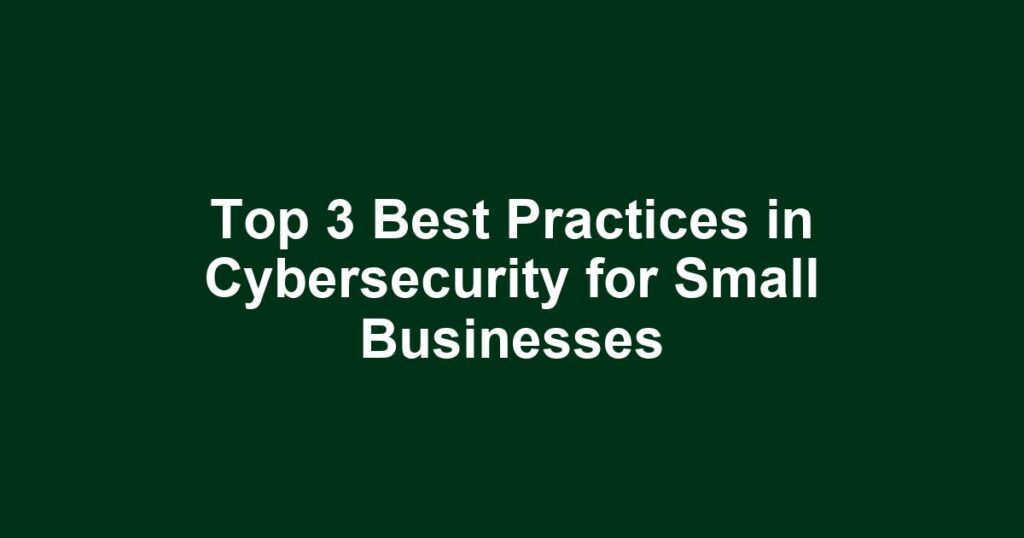Top 3 Best Practices in Cybersecurity for Small Businesses
In an increasingly digital world, cybersecurity has become a critical aspect that small businesses cannot afford to overlook. With cyber threats evolving and increasing in sophistication, small businesses are often targeted due to their perceived vulnerabilities. Implementing effective cybersecurity measures not only protects sensitive data but also builds trust with customers. In this article, we will explore the top three best practices in cybersecurity for small businesses, ensuring you have the tools you need to protect your organization effectively.
1. Conduct Regular Security Assessments
Why Are Regular Security Assessments Important?
Regular security assessments involve evaluating your current cybersecurity measures and identifying any weaknesses that could be exploited by cybercriminals. With the constantly changing landscape of digital threats, these assessments are crucial for keeping your defenses up-to-date.
- Identifies Vulnerabilities: Regular assessments can reveal weaknesses in your security protocols.
- Compliance Assistance: Keeps your business compliant with industry regulations.
- Informed Decision Making: Provides insights for strategic improvements in your cybersecurity posture.
How to Conduct a Security Assessment
Here are some steps to effectively conduct a security assessment:
- Identify Assets: List all digital assets, including hardware, software, and sensitive data.
- Evaluate Risks: Assess the potential risks associated with each asset, including threats and vulnerabilities.
- Implement Solutions: Based on your assessment, put in place necessary security measures.
- Monitor and Update: Create a regular schedule for reassessing your security measures and updating them as needed.
2. Educate Employees on Cybersecurity Best Practices
Why Employee Education is Essential
Your employees are your first line of defense against cyber threats. Human errors, such as falling for phishing scams or using weak passwords, can jeopardize your business’s security. Regular training helps mitigate these risks.
- Reduces Human Error: Education can significantly decrease the chances of accidental security breaches.
- Promotes Vigilance: Well-informed employees are more likely to recognize and report suspicious activities.
- Builds a Security Culture: Establishing cybersecurity as a priority helps create a culture of accountability.
What Topics Should be Covered in Employee Training?
Consider including the following topics in your employee cybersecurity training programs:
- Phishing Awareness: Teach employees how to recognize phishing emails and links.
- Strong Password Practices: Encourage the use of complex passwords and the importance of changing them regularly.
- Data Protection: Discuss the proper handling and storage of sensitive information.
- Remote Work Security: Provide guidelines for securing data when working from home or in public spaces.
3. Invest in Robust Security Tools
What Security Tools Should Small Businesses Utilize?
Investing in reliable security tools is essential for creating a strong cybersecurity framework. The right technology can help protect your business from a variety of threats and vulnerabilities.
- Firewalls: Act as barriers between your internal network and external threats. Ensure you have both hardware and software firewalls in place.
- Antivirus Software: Regularly update antivirus programs to detect and eliminate malware before it can cause harm.
- Encryption: Use encryption tools for sensitive data, both in transit and at rest. This ensures that even if data is intercepted, it remains unreadable.
- Multi-Factor Authentication (MFA): Implement MFA to add an extra layer of security when employees log into company accounts.
How to Implement Security Tools Effectively
Simply having security tools is not enough; you must implement them correctly:
- Assess Your Needs: Determine what tools are appropriate based on your business size and the nature of your operations.
- Regular Updates: Ensure that all security software and tools receive regular updates to combat new threats.
- Integrate Tools: Ensure that the security tools you use can effectively work together for comprehensive protection.
Conclusion
In today’s digital landscape, implementing strong cybersecurity practices is essential for small businesses to protect their sensitive data and maintain customer trust. By conducting regular security assessments, educating employees on best practices, and investing in robust security tools, you can significantly reduce your vulnerability to cyber threats. Remember, cybersecurity is not just the responsibility of your IT team; it requires a collective effort from everyone in your organization.
Are you ready to strengthen your small business’s cybersecurity? Start by assessing your current practices today and make the necessary changes to protect your digital assets. For more information on cybersecurity or to find tailored solutions for your business, contact us today!

